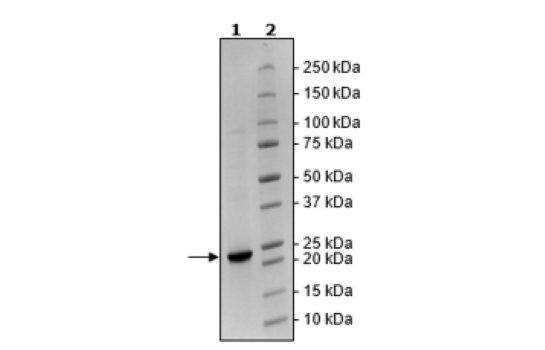KRAS (G12V), Isoform B, His-Tag Recombinant
Recombinant human KRAS (Kirsten rat sarcoma virus GTPase), isoform b, encompassing amino acids 2-185. This construct contains an N-terminal His-tag (6xHis). The protein also contains mutation of interest G12V. The protein was affinity purified.
≥80%
40 mM Tris-HCl, pH 8.0, 110 mM NaCl, 2.2 mM KCl, 0.04% Tween20, 20% glycerol, 3 mM DTT, and variable Imidazole
RAS is a group of small GTPase proteins encoded by 3 genes (HRAS, NRAS, and KRAS), which play critical roles in regulating cell proliferation. KRAS mutations are responsible for more than 30% of human cancers. Although new treatments have been recently developed to mitigate the tumor-promoting effects of RAS mutations, one mutant, KRAS(G12V), has been resistant to most known inhibitors. Compounds that affect the nucleotide exchange (GDP to GTP) reaction in KRAS mutant G12V are expected to inhibit tumor cell growth in KRAS(G12V)-driven tumors. The KRAS (Kirsten rat sarcoma virus) gene is subject to alternative splicing, resulting in two isoforms: KRAS-A and KRAS-B. These isoforms differ by amino acids 151, 153, 165, and 166 and within the hypervariable region (amino acids 167-189). KRAS-B contains a long polybasic stretch, while KRAS-A has a shorter polybasic region with a palmitoylation site. These differences confer distinct biological characteristics to the two isoforms. When studying a mutant of KRAS, it is important to know which isoform is being studied to make sure that the correct wild-type isoform is used for comparison. The identification of new strategies targeting KRAS G12V will bring large benefits in cancer therapy.



